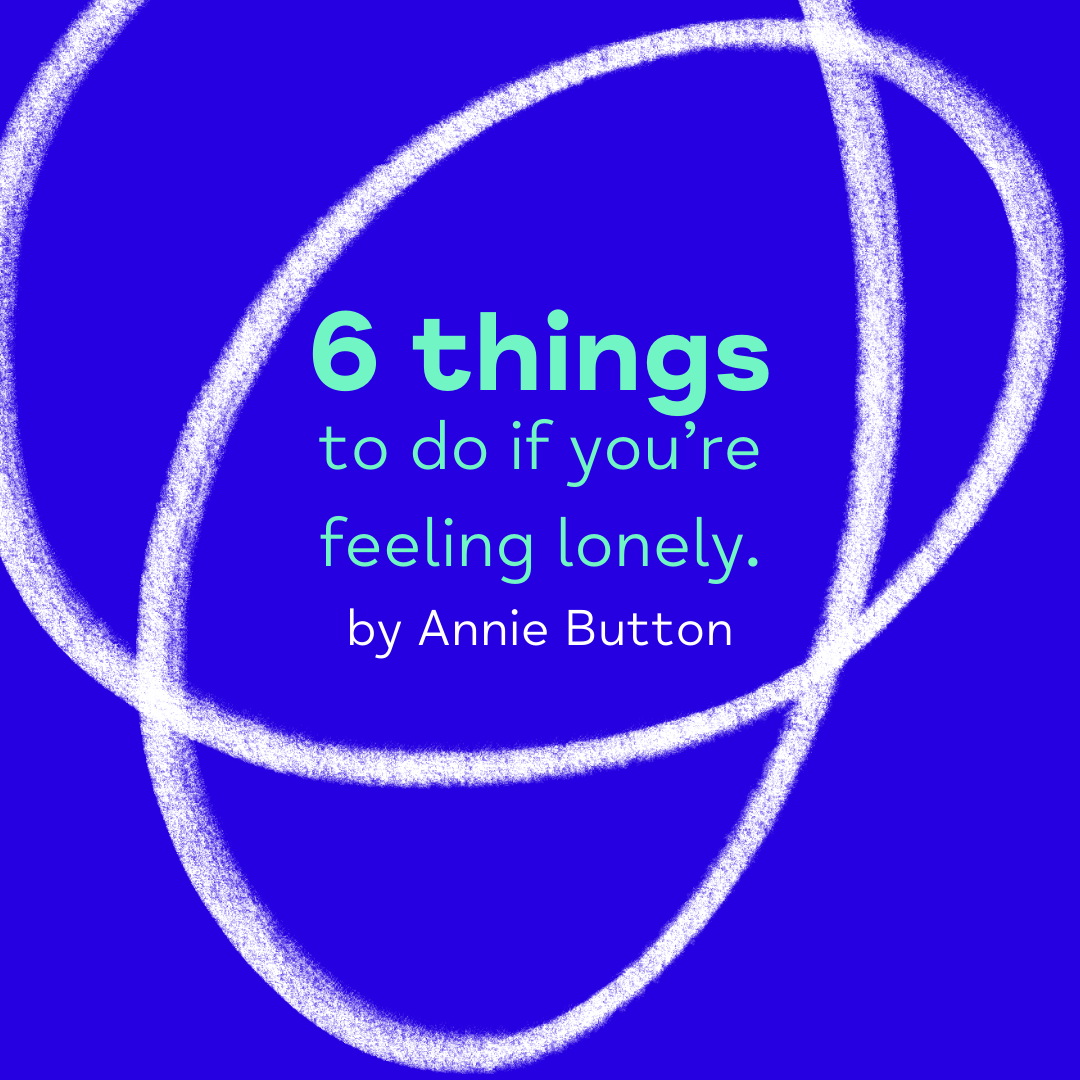6 things to do if you’re feeling lonely – by Annie Button
Feeling lonely, whether you are alone or in a room filled with people, is a completely natural and human emotion that many people experience. Research by the Office for National Statistics discovered that 3.7 million over-16s in Britain feel lonely often or always.
Even people who seem like they are surrounded by friends and family can feel lonely at times. Humans are social beings, after all, so being isolated can be damaging to our mental health.
Someone may experience loneliness because they have no friends or family, or maybe they experience social loneliness due to being shy or anxious when around others. Fortunately, there are things you can do to help reduce feelings of loneliness.
1. Consider a plan to address your feelings
Feelings of loneliness can strike when you least expect them, or they may have been brewing for a long time and stick with you for longer periods. When you do begin to feel lonely it’s important to address those feelings and figure out if it’s the loneliness you are feeling upset about, or if it’s how you feel about being lonely that is the problem.
Consider whether you think the feelings you are experiencing could be solved by making a connection with someone, or whether taking care of your emotions is a better approach. Try to address those feelings by exploring your emotions through making plans with friends or family, or simply giving one of them a call.
Of course, reaching out to someone and not getting a response may make you feel even lonelier but this also allows you to look at the problem from a different perspective. Ask yourself how you are feeling about being on your own. You may choose to engage in a mindfulness activity like gardening or drawing that allows you to help deal with your loneliness both productively and positively.
2. Get crafty or creative
Arts and crafts are excellent activities for boosting your mental health thanks to their mindfulness properties. The beauty of crafts and creative outlets like drawing or painting is that they give you something to focus your attention on. They also encourage you to live in the moment rather than dwelling on negative experiences.
Maybe you don’t have any creative hobbies, well, there’s always a first time and there are so many options out there. Isolating at home in past lockdowns for what seemed like an eternity at the time, might also have inspired some worthwhile solutions to kill time. From simply colouring in to sketching, creating sculptures with clay or stitching a new item of clothing; many crafts can help you create and make things regardless of any skill level.
3. Immerse yourself in nature
Connecting with nature has been shown to have a positive impact on our mental health, particularly in reducing anxiety levels and feelings of depression. There are many ways to appreciate nature, and many of them don’t have to be experienced alone.
From hiking through forest trails to community gardening projects, there is something for most people. You could combine a love of photography and video making with local wildlife or the great outdoors, sharing your images with friends, family or social media groups. Photography and videography is a mindfulness activity in its own right and, combined with immersing yourself in nature, acts as a boost to your mood and your mental health.
4. Join a club
People live in communities as it allows them to interact with others and share their time with like-minded folks who enjoy the same things they do. Thanks to this collective need to share time with others there are clubs for just about every passion or hobby you can think of.
Perhaps you can’t find the right club for you and fortunately, modern technology is here to help. Apps and websites like Meetup.com allow you to start up your own club or group and have people join who also love the same thing you do. This could be centred around a book club, a walking group or something more niche like your favourite computer programme.
Perhaps you have a flair for foreign languages or would like to test your general knowledge skills with other quizzing fans, there are clubs for those too. According to Meetup, “For 20 years, people have turned to Meetup to meet people, make friends, find support, grow a business, and explore their interests”.
Other ways to find groups and clubs in your area include notice boards in supermarkets, social media communities or your local newspaper. By trying a few different events and clubs you might just find something you love while allowing you to meet new people.
5. Help someone else
One of the best ways to make yourself feel like a part of the community is to help out and volunteer at local charities. Not only will you be helping to improve someone else’s life or situation through volunteering but it will help you get out and connect with people.
If there is a particular cause close to your heart, making a difference to the people affected by it can give you a real sense of purpose. A random act of kindness for a stranger can spark a conversation but if you aren’t sure where to begin, many local hospitals, charities and animal shelters commonly welcome volunteers with open arms.
6. Reach out to an old friend
Life can be funny at times and an old friend who you spent day-in and day-out with in the past might just come back into your life once again. It could be a chance encounter in the supermarket or it might be that you reach out randomly to reconnect with them.
Our smartphones and mobile devices allow us to connect with more people than ever but sometimes they have the opposite effect. Seven out of 10 heavy social media users reported feelings of loneliness, according to data from a Cigna study. Images of other people getting together and having a good time can be wounding to those who are already feeling lonely.
But we can use our phones to help us, rather than relentlessly scrolling through social media posts of other people living their lives to the fullest. Many of us find it easy to feel like we need a major reason to call or text someone but that’s not necessarily the case. Sharing something from our everyday life with friends is a great way to spark conversation and make use of the powerful technology we have at our fingertips.
Seek help or advice if you feel lonely
Helping yourself by engaging in these activities and others like them is easier said than done. We understand that if avoiding being lonely was so easy then it wouldn’t affect as many people as it does.
However, seeking help or advice if you feel lonely is an important step towards making things better. Meeting and speaking with a mental health professional can help you to address the feelings of loneliness you are having and help reduce them.




